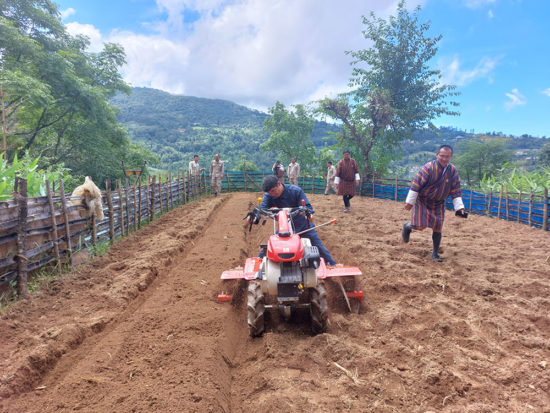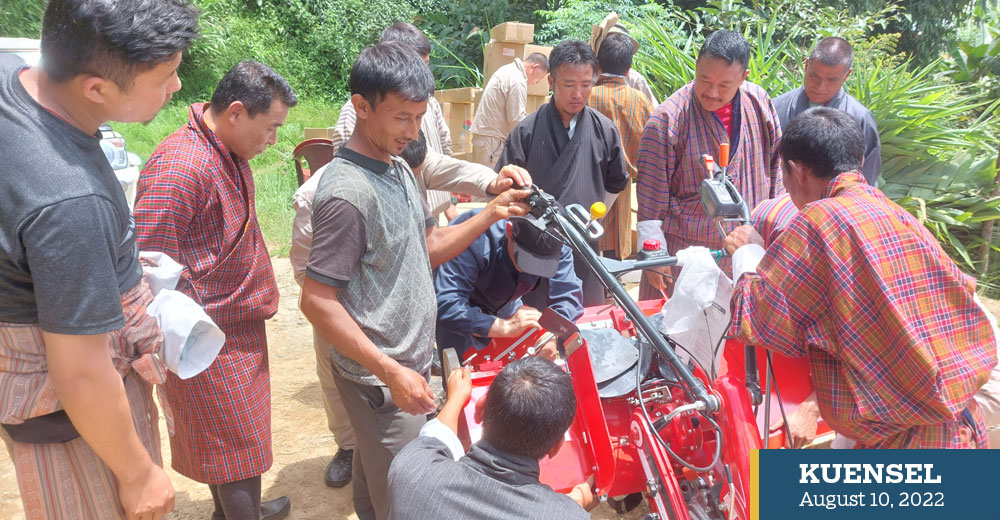Choki Wangmo | Tsirang
As an organic capital, Tsirang is one of the biggest winter vegetable producers in the country.
The dzongkhag has more than 30 farmers’ groups and 21,000 acres of arable land. The climatic conditions have enabled commercial vegetable production in the district.
However, like farmers across the nation, commercial producers in the dzongkhag still practice labour-intensive farming. This has not only affected efficiency and production but it is also expensive.
With the introduction of bed-making machine, days of drudgery could be coming to an end.

The dzongkhag agriculture sector handed over four sets of power tillers and nine sets of bed-making machine to gewog agriculture extension officers yesterday. The Japan-made machinery was procured from the Farm Machinery Corporation Limited at the cost of Nu 1.8 million.
Some of the farmers were visibly thrilled and hopeful.
Tashi Tshering is a progressive farmer in Sergithang gewog. He said that it was difficult to even cultivate a small portion of his five-acre land as it was challenging to get labourers.
“The minimum daily wage rate is not less than Nu 500. To cultivate an acre of land with 15 labourers, it would cost Nu 10,000,” he said. He now hopes that with the help of bed-making machines, he would cultivate an acre with five litres of fuel. “When the cost of production is reduced, the prices of crops and vegetables would decrease too.”
Bholanath Chapagai from Kilkhorthang gewog said that the mechanisation would benefit farmers. We can now cultivate a field that takes two days in the past within an hour, he said.
In the past, even with the helpers, we can cultivate only 60 decimals of land a day, Lal Bdhr Neopani from Gosarling said. “Commercial farming currently is labour-intensive.”
Besides, bed-making, the machines can be used for ploughing and laying mulching plastic.
According to the senior dzongkhag agriculture officer, Dorji Gyeltshen, the machines were handed over to the gewogs with high potential to produce winter crops.
Phuentenchu, Mendrelgang, Kilkhorthang, Sergithang, Dunglagang, and Gosarling gewogs got each machine each.
Although machine operators are deployed, gewog agriculture extension officers of 12 gewogs in the dzongkhag are expected to be trained in how to use the machines.
“Our farmers practice labour-intensive agriculture. Bed-making is a tedious process. These machines could help them save time and resources in the farm,” he said.
It could also help encourage youth in farming, he added.
A Terms of Reference was also developed. It highlights the guidelines on the proper use of machines, management, and sustainability.
The users have to pay Nu 300 an hour to use the machines, from which Nu 200 is paid to the operator and Nu 100 is deposited in the savings account of the group for machine maintenance.
Online sources state that as climate change makes farming far tougher and more young people reject it as a career, giving small-scale farmers access to the right-sized farm machinery, for instance, can help reduce backbreaking labour and keep more people on the land.
Last winter, Tsirang produced 4100 metric tonnes (MT) of winter vegetable, from which 450MT are chillies.


